|
| |
Olmeca's Musik de La Contra Cultura
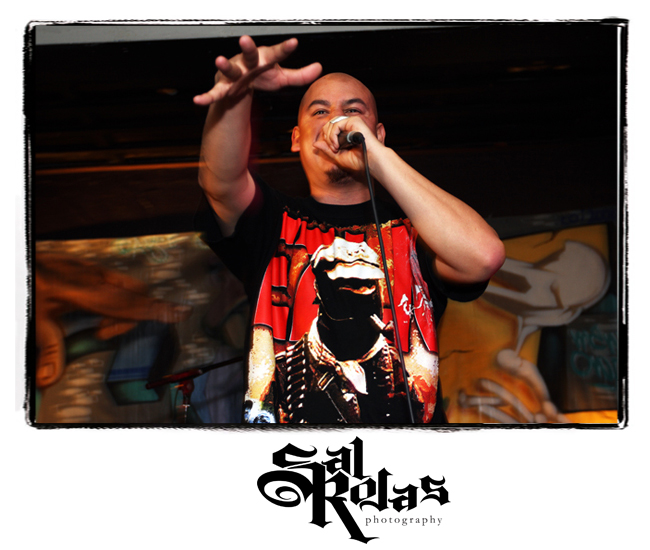
Olmeca's CD Release Party in East Los Angeles, CA | Photography by Salvador Rojas
[BrownPride.com] - Tell us about yourself as an emcee for those
that don't know about Olmeca's Musik?
[OLMECA] - I was born in El
Sereno, grew up Mexico and in neighborhoods in L.A. like South Central, Rosemead
and East L.A.
When I was 15, my family moved to North Carolina (For
those of you that don’t know this is what undocumented families do when there
are no jobs. We migrate and go wherever there’s a need for cheap labor). I took
some mix-tapes given by homies of mine from Rosemead. It had some “Wake Up” and
“Seditious Beats” radio shows on it, Wu-Tang Clan, Styles of Beyond and others
were on those tapes. I started listening to Mack 10, Ice Cube, Dr. Dre and
others that were on the radio and television at the time. Their lyrics reminded
me of home. When I returned to L.A. Rosemead, I looked for underground spots and
soon enough came across “Project Blowed.” I found myself going every Thursday
and paying my dues. I started working for their magazine and wrote reviews. I
did an interview with a group called “Acid Reign.” We showed each other our
music. Eventually I was invited to do some shows with them and before I knew it,
I was an official member.
I started writing in Spanish. To my surprise,
a lot of folks were into it, “That ish was dope; I wish I knew what you were
saying!” People liked the styles and at Project Blowed and in the L.A.
underground, that’s what mattered most!
I looked for a space where I
could write more in Spanish and write music that was more culturally and
politically based. I found Slowrider. This got me into the Xicano music scene of
East Los Angeles, from there on I have existed in both worlds and now I’m
expanding by making my own support base throughout the United States.
As
an emcee I don’t limit myself to “scenes.” I do my thing; I often organize my
own shows and spread the word. That’s one of the reasons Hip-Hop heads, punk
rockers, anarchists, teachers, professors, knuckleheads, organizers and
everything in between support my music.
[BrownPride.com] - On a
more personally level what does your musik mean to you?
[OLMECA]
- My music means the world to me. I started making musik when I was 15 years
old. When I was a young one, I went to gigs with my pops who was a musician (a
drummer for cumbia groups). My family left to seek better opportunities and
music and my community replaced my family. Literally! See my family and I have
been through the toughest times. We crossed the border together, moved around
month to month from place to place, lived in other people’s homes, slept in the
back of trucks. I grew up with a desire to make things better not only for my
family but for homies and their families without dealing or giving into the same
oppressive system.
My life purpose is to help inspire and bring about
real change. I think for people of color, we have to tap into our culture and
traditions. For La Raza, I believe that if we can learn our history, we’ll see
how we are indigenous peoples of a raped continent. We can then get closer to
the prophecy of the Eagle and the Condor, musik is my vehicle for this!
[BrownPride.com] - What are some influences we can find in your
musik and lyrics?
[OLMECA] - Like many people out there, being
brown in the United States means you grow up in two cultures. So, musically
everything my family grew up on, I also grew up on + pop culture and Hip-Hop.
History and stories of resistance motivate me greatly. The Zapatista Movement is
part of my life and I have a life commitment to them. My own experiences as an
artist in rebellion/organizer/revolutionary help me stay grounded and so in my
music; I contextualize many of those experiences.
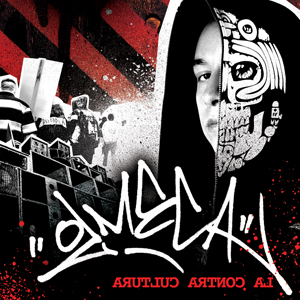
[BrownPride.com] - You just released your second solo album "La
Contra Cultura"?
[OLMECA] - Yeah, “La Contra Cultura / Counter
Culture” is the story and the thoughts of a kid who grows up poor and then, not
by choice but by circumstance, becomes a rebel and a fighter against Imperialism
and for humanity and dignity. The idea behind it is to show that we are no
different. I want people to carefully listen and see how our stories are the
same. With “La Contra Cultura”, I want to help grow our political and cultural
work and really come together “pa’ darle duro al sistema!”
I’ve always
been considered a political artist. I don’t disagree with that, but I would
consider my music much more holistic. It is depicting the reality of a brown
person growing up in the hood not as a victim, but as a person who is figuring
out the plot of the system, fighting against and creating alternatives. In other
words, America, don’t feel sorry for us. We can take care of ourselves… the
question is “are you down to roll with us or not!” That’s “La Contra Cultura.”
Let’s get FREE!!!
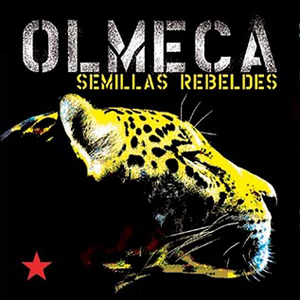
[BrownPride.com] - How does it differ from your debut album
"Semillas Rebeldes"?
[OLMECA] - “Semillas Rebeldes” was a dope
album to me. I wrote most of it and recorded it while I was in Chiapas, Mexico
and in Zapatista communities for almost a year. “Semillas Rebeldes” describes
the way of life the Zapatistas live by, Autonomy! Semillas is influenced by the
sounds I heard in Chiapas and carries that mood. “La Contra Cultura”, sounds
like it was made in the concrete jungle. In both of my albums the mood of the
music changes, being a revolutionary doesn’t mean that you’re always mad. Also
don’t mistake urgency with anger. We are humans; we are part of this reality. We
come with many layers. I don’t shy away from them; I celebrate them. So, in both
albums you hear fast and slow songs. “La Contra Cultura” is simply more personal
and direct.
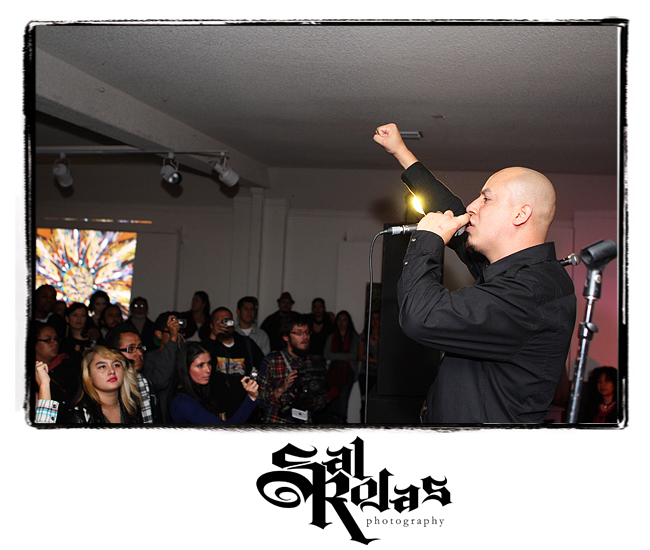
Olmeca's CD Release Party in East Los Angeles, CA | Photography by Salvador Rojas
[BrownPride.com] - When you perform on stage you like
to perform with a live band when you are able to?
[OLMECA]
Performing with a DJ and a microphone is dope and it has its place, but if I was
given the option I would always go with the live band. I’m an emcee but also a
musician and producer. To me, rocking a show with a band feels more complete.
Every show has different people and different energies. With a live band, you
can sway the moods or go along with the energy people are giving you much easier
than with a playback. One song can go from 3:30 minutes to 10 minutes, you can
mix the songs, come back to one later, flip it and freestyle the possibilities
are endless. The other thing is that mainstream America still doesn’t view
Hip-Hop as a credible music form. I appreciate it when doubters give respect
after the shows.
[BrownPride.com] - You travel a lot in support of your
musik?
[OLMECA] - I’ve been blessed to go to Florida, Illinois,
Wisconsin, Northern California, Arizona, Mexico and Canada. I’ve done shows with
the legendary Bahamadia, Saul Williams, Dilated People’s and other dope artists.
I’ve been very fortunate to have constant support. In my opinion, my loyalty
comes from the relationship I build with them during the shows. It’s a crazy
variety of people that support. There are the obvious street heads and activists
circles. There are college professors and high school teachers. A lot of folks
who are not normally into hip-hop, but appreciate the message are constantly
there also. It’s been a blessing and I am very thankful for that support.
[BrownPride.com] - What's been your favorite place to visit and
why?
[OLMECA] - One of my favorite places to visit has been the
Midwest. Chicago, Illinois has been showing support for over three years now.
The people are on point with their organizing. They have their own scene and
network.
Madison, Wisconsin (yeah, I said it right) the college party
capital of the U.S. has shown support too. Quick story, I’m walking down the
“hall of shame” (where all the fraternities and sororities are at). Three loud
white folks see me coming and they get quiet and they part like the red sea and I start laughing. I’m not laughing at them, I’m laughing at the girls tanning on the front yard while listening to The Game, some funny shit!
[BrownPride.com] -
What's in the works for 2010?
[OLMECA] - We’ll be working on
music videos for the singles “Pieces of Me” and “Counter Culture” in support of
the album. I’m also helping produce other artists, working on a compilation
album on immigration, a collaborative CD of Son Jarocho (traditional musical
style of Veracruz, Mexico) and Hip-Hop production, and a book/memoir that
compliments “La Contra Cultura” album.
Beyond that, I’ll be touring
again and organizing some events in the greater Los Angeles area.
[BrownPride.com] - Where can we pick up copies of your albums and all
the latest information on your future projects?
[OLMECA] - We can get
all the latest information pertaining to me at www.olmecamusik.com,
myspace/olmeca, and on Facebook.
You can purchase the albums on ITUNES, www.cdbaby.com, but before you go there, go to all the indie stores in Los Angeles (Imix Bookstores, Nahui Ollin, Mi Vida, Radio Futura, The Globe). In other words any local store around you should have the CDs. If you don’t find it there go to www.myspace.com/olmeca and buy it from there if not then go to ITunes or cdbaby.com or any other digital distributor like Amazon.com.
Interview and Photographs by Salvador Rojas
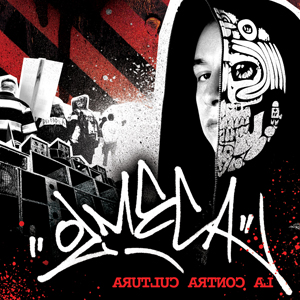
Olmeca's La Contra Cultura | Counter Culture
1. Intro to Counter Culture / La Contra Cultura
2. Counter Culture
3. No Vengo Solo feat. Marisoul
4. The World Famous Wake Up Show Interlude
5. Pieces of Me
6. A La Cadencia
7. Corn Grenade Renegade
8. Duro
9. Can't Stop Me feat. Acid Reign
10. Nuevo Amanecer
11. Keep it Moving
12. Al Carajo
13. Beauty of REsistance
14. Ofrenda
15. Pa' Mi Ma feat. Destani Wolfe
16. Outro
Click Here to Purchase "La Contra Cultura" from BrownPride.com
|
|
|
|




